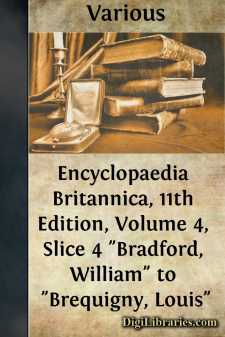Categories
- Antiques & Collectibles 13
- Architecture 36
- Art 48
- Bibles 22
- Biography & Autobiography 813
- Body, Mind & Spirit 142
- Business & Economics 28
- Children's Books 15
- Children's Fiction 12
- Computers 4
- Cooking 94
- Crafts & Hobbies 4
- Drama 346
- Education 46
- Family & Relationships 57
- Fiction 11828
- Games 19
- Gardening 17
- Health & Fitness 34
- History 1377
- House & Home 1
- Humor 147
- Juvenile Fiction 1873
- Juvenile Nonfiction 202
- Language Arts & Disciplines 88
- Law 16
- Literary Collections 686
- Literary Criticism 179
- Mathematics 13
- Medical 41
- Music 40
- Nature 179
- Non-Classifiable 1768
- Performing Arts 7
- Periodicals 1453
- Philosophy 64
- Photography 2
- Poetry 896
- Political Science 203
- Psychology 42
- Reference 154
- Religion 513
- Science 126
- Self-Help 84
- Social Science 81
- Sports & Recreation 34
- Study Aids 3
- Technology & Engineering 59
- Transportation 23
- Travel 463
- True Crime 29
Encyclopaedia Britannica, 11th Edition, Volume 4, Slice 4 "Bradford, William" to "Brequigny, Louis"
by: Various
Categories:
Description:
Excerpt
BRADFORD, WILLIAM (1590-1657), American colonial governor and historian, was born in Austerfield, Yorkshire, England, probably in March 1590. He became somewhat estranged from his family, which was one of considerable importance in the locality, when in early youth he joined the Puritan sect known as Separatists, and united in membership with the congregation at Scrooby. He prepared in 1607, with other members of the church, to migrate to Holland, but the plan was discovered and several of the leaders, among them Bradford, were imprisoned. In the year following, however, he joined the English colony at Amsterdam, where he learned the trade of silk weaving. He subsequently sold his Yorkshire property and embarked in business on his own account at Leiden, where the English refugees had removed. He became an active advocate of the proposed emigration to America, was one of the party that sailed in the “Mayflower” in September 1620, and was one of the signers of the compact on shipboard in Cape Cod Bay. After the death of Governor John Carver in April 1621, Bradford was elected governor of Plymouth Colony, and served as such, with the exception of five years (1633, 1634, 1636, 1638 and 1644) until shortly before his death. After 1624, at Bradford’s suggestion, a board of five and later seven assistants was chosen annually to share the executive responsibility. Bradford’s rule was firm and judicious, and to his guidance more than to that of any other man the prosperity of the Plymouth Colony was due. His tact and kindness in dealing with the Indians helped to relieve the colony from the conflicts with which almost every other settlement was afflicted. In 1630 the council for New England granted to “William Bradford, his heires, associatts, and assignes,” a new patent enlarging the original grant of territory made to the Plymouth settlers. This patent Bradford in the name of the trustees made over to the body corporate of the colony in 1641. Bradford died in Plymouth on the 9th of May 1657. He was the author of a very important historical work, the History of Plimouth Plantation (until 1646), first published in the Proceedings of the Massachusetts Historical Society for 1856, and later by the state of Massachusetts (Boston, 1898), and in facsimile, with an introduction by John A. Doyle, in 1896. The manuscript disappeared from Boston during the War of Independence, was discovered in the Fulham library, London, in 1855, and was returned by the bishop of London to the state of Massachusetts in 1897. This work has been of inestimable value to writers on the history of the Pilgrims, and was freely used, in manuscript, by Morton, Hubbard, Mather, Prince and Hutchinson. Bradford was also undoubtedly part author, with Edward Winslow, of the “Diary of Occurrences” published in Mourts’ Relation, edited by Dr H.M. Dexter (Boston, 1865). He also wrote a series of Dialogues, on church government, published in the Massachusetts Historical Society’s Publications (1870.)
For Bradford’s ancestry and early life see Joseph Hunter, Collections concerning the Founders of New Plymouth, in Massachusetts Historical Society’s Collections (Boston, 1852); also the quaint sketch in Cotton Mather’s Magnalia (London, 1702), and a chapter in Williston Walker’s Ten New England Leaders (New York, 1901).
...











